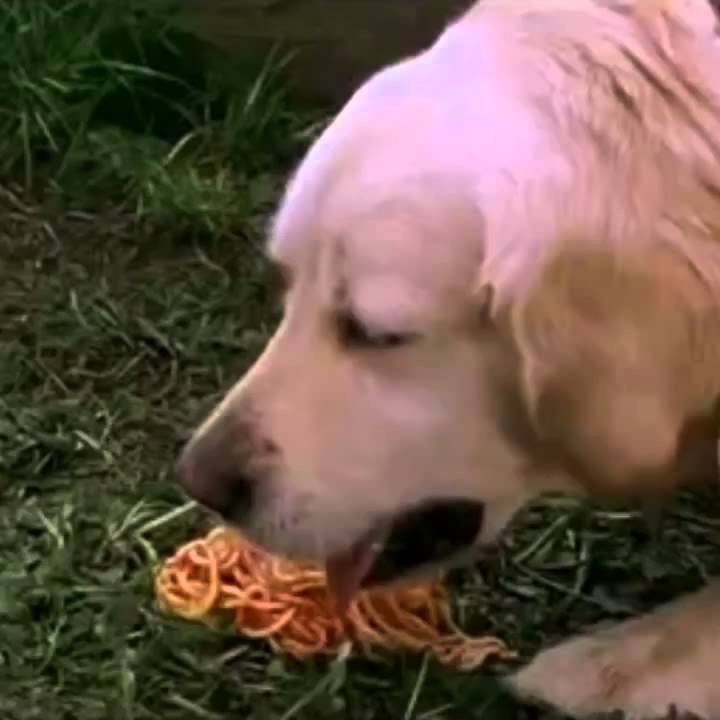
It’s always a worry when your pet presents with an issue that wasn’t there before. There is a moment of panic that all pet owners endure and one that immediately sends us to Google. The goal of Can Pets Eat is to answer those questions and in this article we’ll tell you what the issue is with a dog throwing up undigested food. So, if your adult dog or puppy is vomiting chunks of food that hasn’t been digested properly, read below to find out what the issue is.
Dog Throwing up Undigested Food
Vomiting can either be a serious issue in pets or a common one. With cats, for instance, it’s common practice and any cat owner will tell you that they can no longer remember how many times their cats have thrown up in the last few months alone. With rabbits and other small animals, it’s rare and is likely to be an indictor of a serious issue. With dogs, it’s somewhere in the middle.
It may be that they ate something that didn’t agree with then. It may be that they just got too excited but it may also be something serious. The first thing we need to do is separate vomiting and regurgitation.
A dog throwing up undigested food is not technically vomiting but regurgitating. The former comes strictly from the stomach, the latter can come from the esophagus. So, let’s look at these two issues to get to the bottom of why your dog is throwing up undigested food or vomiting.
Causes of Vomiting in Dogs
There are many causes, including serious ones, but serious issues are often accompanied by more than just vomiting. Dogs may vomit after eating rancid food and garbage for instance. In such cases it is not likely to be accompanied by any other symptoms and is probably nothing to worry about.
However, if they are vomiting because they ate a poisonous plant or food then the vomiting could be an initial sign that is then followed by other, more serious ones. Or it could be a sign that the toxicity is beginning to take hold. If you suspect this to be the case seek medical help immediately.
If the vomiting is chronic, or if it presents with diarrhea or other worrying symptoms, you should also seek medical help as it may be connected to a disease or disorder. Some of the other not-so-serious causes of vomiting in dogs (including eating trash and rancid food, which is rarely a major issue) include stress, over-excitement and exposure to loud noises, such as thunder and fireworks or gunshots.
Dog Throwing up Undigested Food (Regurgitating)
If the vomiting of undigested food occurs 12 hours after they last ate, then it signals an issue with digestion. The food should have been digested by that point and it should be on its way out, so if it has been vomited then there could be an issue with digestion.
If it is right after they have eaten, then they might have just eaten too quickly, eaten too much or eaten when they were too excited. It may also be a result of over-exertion or over-excitement right after eating. It’s a similar issue you may have experienced if you have children, and the case is often the same, as children, like dogs, don’t know not to run around right after eating either.
If they are throwing up undigested food on a regular basis then it could indicate something more serious, from problems with the esophagus and stomach, to short-term viruses and more. Even if you suspect it not to be a serious issue, you should still consult a qualified vet if it keeps happening.
Repeated vomiting like this can not only have a serious underlying cause, but the act of vomiting itself depletes the body of essential electrolytes and they will also be deprived of nutrients if they are vomiting before the food is being digested.
Puppy Vomiting Undigested Food

This is actually more common in puppies. They are still developing, still growing. That, along with the fact that they may be more likely to eat foods they shouldn’t be eating and to run around like crazy after they have eaten, means that throwing up undigested food may be more common. As can throwing up food in general.
Your vet will understand what to do and will likely check the age of the dog, while also asking questions about the type of food it is being fed, the amount of time between eating and vomiting, and how much food is being vomited. Sometimes it can be a simple case of a new dog owner not knowing what to feed their puppy and giving it things that it struggles to digest.
They may be feeding it food that was designed for adult dogs. They may be overfeeding it, assuming that they can just fill the bowl and that the dog will eat what it needs and then stop (anyone with experience of dogs and other animals knows that if you do this, then you’re going to have an empty bowl and a pile of vomit on your hands, because pets rarely know when to stop.)
It may also be that members of the family are slipping it human food. In this case, it is very important that you know what it was fed and that you make sure all members of the family stop feeding the dog like this. As discussed many times already, many human foods can be unhealthy for dogs (see Twizzlers) while others can be poisonous (see Grapes.)
Preventing a Dog From Vomiting
There is no real way to prevent a puppy or adult dog from vomiting other than to make sure you cut off the cause of this in the first place. If the cause is a certain type of food or treat, or an amount of food then that is easily done. If they are eating too quickly, a trait more common when you have multiple dogs, then you just need to feed them smaller potions throughout the day.
Generally, if you keep them healthy, well-fed and make sure they have plenty of fresh water, then you are already doing all that you can to prevent vomiting. Of course, many underlying causes can not be helped, and in those cases you just need to get to the root of the problem as quick as possible, which often requires seeking help from a qualified vet.